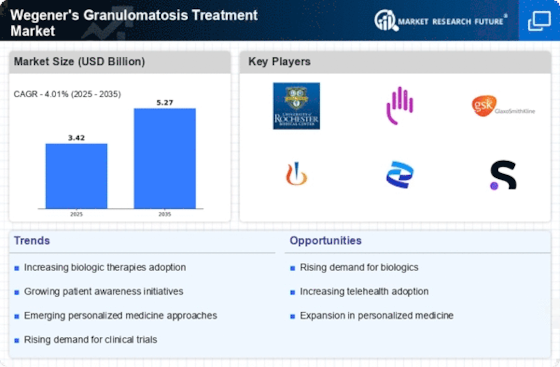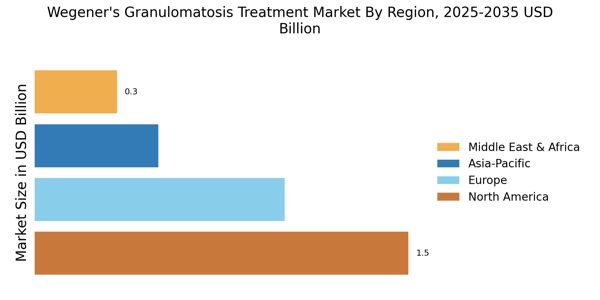Increased Awareness and Education
Increased awareness and education regarding Wegener's Granulomatosis are pivotal in driving the Wegener's Granulomatosis Treatment Market. Efforts by healthcare organizations and advocacy groups to educate both the public and medical professionals about the disease are yielding positive results. Enhanced understanding of the symptoms and complications associated with Wegener's Granulomatosis is likely to lead to earlier diagnosis and treatment, which is essential for improving patient prognosis. Furthermore, as more healthcare providers become familiar with the latest treatment guidelines and options, the demand for effective therapies is expected to rise. This heightened awareness is anticipated to contribute to the overall growth of the Wegener's Granulomatosis Treatment Market, as more patients seek appropriate care.
Advancements in Biologic Therapies
Recent advancements in biologic therapies are significantly influencing the Wegener's Granulomatosis Treatment Market. Biologics, which target specific components of the immune system, have shown promise in treating autoimmune diseases, including Wegener's Granulomatosis. The introduction of agents such as rituximab and tocilizumab has transformed treatment paradigms, offering patients more effective options with potentially fewer side effects compared to traditional therapies. Market data indicates that the biologics segment is expected to witness substantial growth, driven by ongoing clinical trials and the increasing approval of new biologic agents. As healthcare providers continue to adopt these innovative therapies, the Wegener's Granulomatosis Treatment Market is likely to experience a shift towards more personalized and targeted treatment approaches.
Regulatory Support for New Treatments
Regulatory support for new treatments is emerging as a significant driver for the Wegener's Granulomatosis Treatment Market. Regulatory agencies are increasingly recognizing the need for expedited approval processes for therapies targeting rare and complex diseases, including Wegener's Granulomatosis. Initiatives such as orphan drug designations and fast-track approvals are facilitating the entry of innovative treatments into the market. This supportive regulatory environment encourages pharmaceutical companies to invest in the development of new therapies, which could lead to a broader range of options for patients. As a result, the Wegener's Granulomatosis Treatment Market is likely to benefit from an influx of novel treatments that address unmet medical needs, ultimately improving patient care.
Rising Incidence of Wegener's Granulomatosis
The increasing incidence of Wegener's Granulomatosis appears to be a primary driver for the Wegener's Granulomatosis Treatment Market. Recent epidemiological studies indicate that the prevalence of this autoimmune disease is on the rise, with estimates suggesting that it affects approximately 3 to 10 individuals per 100,000 people. This growing patient population necessitates the development and availability of effective treatment options, thereby propelling market growth. Furthermore, as awareness of the disease increases among healthcare professionals and patients alike, more individuals are likely to seek diagnosis and treatment, further expanding the market. The need for innovative therapies to manage this complex condition is becoming increasingly urgent, which may lead to heightened investment in research and development within the Wegener's Granulomatosis Treatment Market.
Growing Investment in Research and Development
The growing investment in research and development (R&D) is a crucial driver for the Wegener's Granulomatosis Treatment Market. Pharmaceutical companies and research institutions are increasingly allocating resources to explore novel therapeutic options and improve existing treatments. This trend is underscored by the rising number of clinical trials focused on Wegener's Granulomatosis, which has seen a marked increase in recent years. According to industry reports, R&D spending in the autoimmune disease sector is projected to grow significantly, reflecting the urgent need for effective therapies. As new findings emerge from ongoing research, the Wegener's Granulomatosis Treatment Market is poised for innovation, potentially leading to breakthroughs that could enhance patient outcomes and expand treatment options.

















